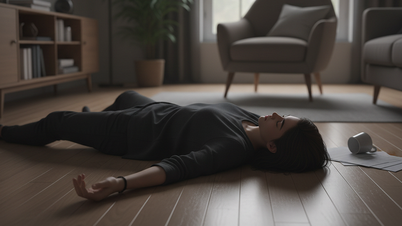Sleeping with a high pillow, lying on your side, practicing deep breathing, and cleaning your nose can clear your airways and reduce snoring.
Snoring disrupts the sleep cycle, causing drowsiness and fatigue the next morning. Some changes in sleep habits can help snorers reduce this condition.
Set a sleep schedule
Snoring is sometimes caused by an inconsistent sleep schedule. People who work long hours before bed or do not get enough sleep over a long period of time put their bodies under stress. When lying down, the muscles at the back of the throat relax more than usual, increasing the likelihood of snoring.
To avoid this situation, you should go to bed at the same time, not too early or too late, and maintain 7-9 hours per night.
Avoid stimulants and electronic devices
This factor can interfere with sleep or affect the respiratory system, increasing the possibility of sleep apnea causing snoring. People who snore should turn off electronic devices about an hour before going to bed, limit caffeinated drinks such as tea, coffee, soda. Caffeine remains in the body for 5 to 10 hours after drinking. Alcohol slows down metabolism, hinders brain activity, leading to difficulty sleeping.
Practice breathing exercises
Some exercises help the body relax, promote breathing movement, reduce obstructive sleep apnea. Taking deep breaths for a few minutes, focusing on breathing can improve snoring. The 4-7-8 breathing technique, which means breathing in for a count of 4, holding your breath for a count of 7, and breathing out for a count of 8, also helps.
High pillow
Using a pillow to sleep on can realign the tongue and jaw muscles, open up the airway, and reduce snoring. People who snore should place a pillow under their head or behind their back. If the pillow is thin, add more or double it.

Elevating the head helps clear the airways and reduces snoring. Photo: Freepik
Clean the bedroom
The sleeping space needs to be kept clean by changing sheets and pillows regularly and vacuuming. Irritants such as dust, pollen, dander and other airborne particles are removed. Because they affect the membranes of the throat and palate, narrowing the airways leading to snoring. The bedroom also needs to turn off all electrical devices, when the room is too bright it leads to difficulty sleeping.
Lying on your side
Lying on your back causes your tongue and soft palate to collapse behind your throat, restricting airflow to your lungs and causing snoring. To fix this, sleep on your side. This position helps reposition your tongue and jaw muscles, opening up your airways and reducing the risk of snoring.
Clear your nose before bed
Blocked sinuses can lead to difficulty breathing, mouth breathing, and increased risk of snoring. People with sinusitis should clean their nose before going to bed by taking a warm shower for a few minutes and using a cleaning solution. If snoring does not improve and affects daily activities, the patient should see a doctor.
Bao Bao (According to Wikihow )
Readers can ask questions about respiratory diseases here to get answers from doctors.
Source link


![[Photo] President Luong Cuong attends the 80th Anniversary of the Traditional Day of Vietnamese Lawyers](https://vphoto.vietnam.vn/thumb/1200x675/vietnam/resource/IMAGE/2025/10/09/1760026998213_ndo_br_1-jpg.webp)



![[Photo] General Secretary To Lam visits Kieng Sang Kindergarten and the classroom named after Uncle Ho](https://vphoto.vietnam.vn/thumb/1200x675/vietnam/resource/IMAGE/2025/10/09/1760023999336_vna-potal-tong-bi-thu-to-lam-tham-truong-mau-giao-kieng-sang-va-lop-hoc-mang-ten-bac-ho-8328675-277-jpg.webp)
![[Photo] Prime Minister Pham Minh Chinh chairs a meeting of the Government Standing Committee on overcoming the consequences of natural disasters after storm No. 11](https://vphoto.vietnam.vn/thumb/1200x675/vietnam/resource/IMAGE/2025/10/09/1759997894015_dsc-0591-jpg.webp)




























































































Comment (0)